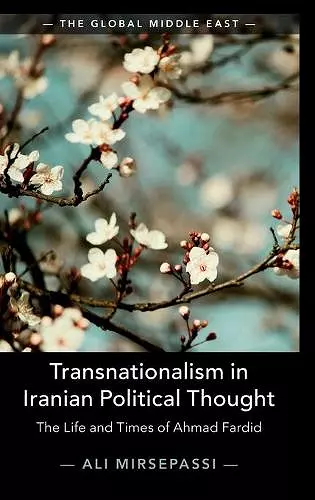Transnationalism in Iranian Political Thought
The Life and Times of Ahmad Fardid
Format:Hardback
Publisher:Cambridge University Press
Published:23rd Feb '17
Currently unavailable, and unfortunately no date known when it will be back
This hardback is available in another edition too:
- Paperback£26.99(9781316636473)

A study of the life and thought of the Iranian philosopher Ahmad Fardid and the development of political philosophy in post-revolutionary Iran.
An account of the rise of political Islam in modern Iran, following the intellectual journey of the philosopher Ahmad Fardid. This book will be of use to scholars in courses studying modern Iran, political Islam and the politics of the Middle East, philosophy, post-colonial studies, religious studies and social theory.During the Iranian Revolution of 1978/9, the influence of public intellectuals was widespread. Many espoused a vision of Iran freed from the influences of 'Westtoxification', inspired by Heideggerian concepts of anti-Western nativism. By following the intellectual journey of the Iranian philosopher Ahmad Fardid, Ali Mirsepassi offers in this book an account of the rise of political Islam in modern Iran. Through his controversial persona and numerous public and private appearances before, during and particularly after the Revolution, Fardid popularised an Islamist vision militantly hostile to the modern world that remains a fundamental part of the political philosophy of the Islamic Republic to this day. By also bringing elements of Fardid's post-revolutionary thought, as well as a critical analysis of Foucault's writings on 'the politics of spirituality', Mirsepassi offers an essential read for all those studying the evolution of political thought and philosophy in modern Iran and beyond.
'This book is a fascinating account of one of the most enigmatic intellectuals of modern Iran, the father of the idea of Westoxication. It offers an analytical frame whose implications go beyond Iran, disclosing how such anti-modern thinking is linked to the ideas of European luminaries such as Heidegger, Corbin, and Foucault. A meticulous example of scholarship.' Asef Bayat, Catherine and Bruce Bastian Professor of Global and Transnational Studies, University of Illinois, Urbana-Champaign
'Ali Mirsepassi's book recounts the fascinating story of a momentous cross-cultural encounter between Western thought and Islam. At the center of his account lies the reception of the German philosopher Martin Heidegger's thought by the influential Iranian Islamist, Ahmad Fardid. Not only has Mirsepassi provided us with an outstanding study of the transnational circulation of ideas. His book also stands as a powerful cautionary tale concerning the ideological perils of virulent 'anti-modernism' - a tale that has the potential to revolutionize many of the unstated assumptions underlying the field of postcolonial studies.' Richard Wolin, Distinguished Professor of History and Political Science, CIty University of New York Graduate Center
'… Mirsepassi's Transnationalism in Iranian Political Thought is an informative and insightful reading for anyone who wants to understand the complex mindset of Fardid and the network of ideas that orchestrated the course of the twentieth-century intellectual history of Iran.' Mustafa Aslan, Kult Online
ISBN: 9781107187290
Dimensions: 235mm x 159mm x 23mm
Weight: 760g
408 pages